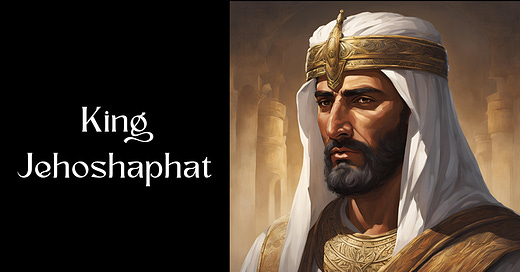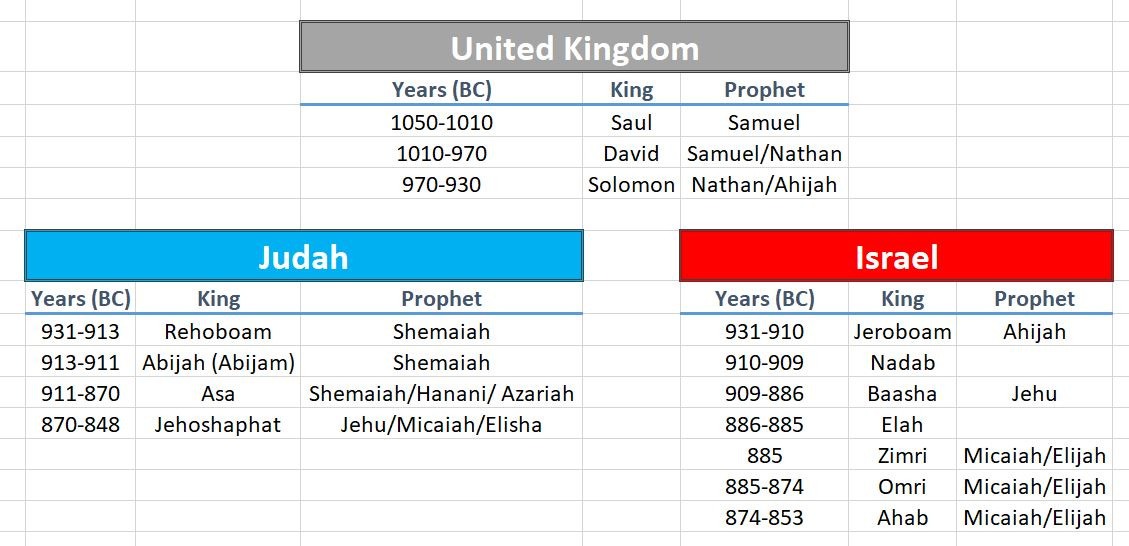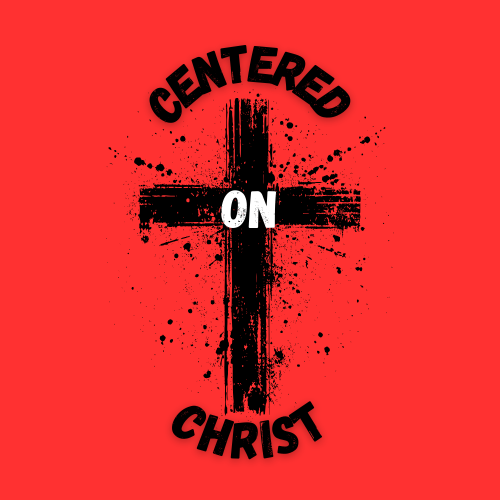After quite a while of studying the kings in the northern kingdom, we turn our attention back toward the southern kingdom of Judah.
King Jehoshaphat was a faithful - although flawed - king of Judah. As we will see, his trust in God is exemplary for all generations for all time.
The Overview of Jehoshaphat’s Reign.
Asa’s son, Jehoshaphat, becomes king of Judah during Ahab’s fourth year as king of the northern kingdom (1 Kings 22:41). Jehoshaphat becomes king at the age of 35, and reigns for 25 years (1 Kings 22:42). The “queen mother” was “Azubah (her name means “deserted” or “forsaken”), the daughter of Shilhi.”
Jehoshaphat was faithful just as his father Asa had been. He did “what was right in the eyes of the LORD” (1 Kings 22:43). He “did not seek the Baals, but sought the God of his father, and walked in His commandments and not according to the acts of Israel” (2 Chronicles 17:3-4).
However, Jehoshaphat had a couple of failures that stand out.
Trouble with the High Places.
Jehoshaphat delighted in serving the Lord, and had the high places and wooden images removed from Judah (2 Chronicles 17:6). He also sent teachers and priests throughout all the cities of Judah to teach the people the “Book of the Law of the LORD” (2 Chronicles 17:7-9).
Later, Jehu the son of Hanani the seer commended Jehoshaphat for removing “the wooden images from the land” (2 Chronicle 19:3).
After this, Jehoshaphat renewed his efforts to reach all the people in his kingdom - not just the tribe of Judah - and brought the people back to the LORD God from Beersheba (the southern end of the kingdom) to the mountains of Ephraim (the northern end of the kingdom) (2 Chronicles 19:4).
However, while the high places were taken away in Judah, it seems they were not taken away in the more remote locations of the kingdom that Jehoshaphat visited the second time (2 Chronicles 20:33). We also have no mention of teachers and priests being sent throughout these areas like what was done in cities of Judah.
It appears to me that the efforts to bring the people back to God were not as thorough in the areas further from Jerusalem as they had been in the cities closer to Jerusalem.
Alliance with Israel.
Another major shortcoming of Jehoshaphat’s reign - and one that keeps popping up throughout the biblical record - is his alliance with the king of Israel (1 Kings 22:44). He arranged this alliance by having one of his sons - Jehoram - marry one of Ahab’s daughters (2 Chronicles 18:1; 21:16). This would eventually cause a disaster in Judah.
When Jehoshaphat returned from fighting alongside Ahab in battle (2 Chronicles 18), the Lord’s prophet arrived and rebuked Jehoshaphat.
And Jehu the son of Hanani the seer went out to meet him, and said to King Jehoshaphat, "Should you help the wicked and love those who hate the LORD? Therefore the wrath of the LORD is upon you. (2 Chronicles 19:2)
Later, during the reign of Ahab’s son Jehoram, Jehoshaphat agrees AGAIN to help the king of Israel in battle (2 Kings 3:7). When the kings go to inquire of God about the battle, God says through Elisha:
As the LORD of hosts lives, before whom I stand, surely were it not that I regard the presence of Jehoshaphat king of Judah, I would not look at you, nor see you. (2 Kings 3:14)
Jehoshaphat finally learned his lesson about his bad alliances with the northern kingdom when ships he built with the king of Israel to transport gold were wrecked (1 Kings 22:48-49; 2 Chronicles 20:35-37).
While Jehoshaphat’s failures are highlighted, so are his faithfulness and God’s blessings upon him.
Jehoshaphat’s Prosperity and Power.
Because of Jehoshaphat’s faithfulness, the Lord blessed him with strength, riches, and honor (2 Chronicles 17:5). Foreign nations like the Philistines and Arabians brought him tribute (2 Chronicles 17:11).
He built up the nation’s fortifications and military (2 Chronicles 17:12-19). Jehoshaphat was a mighty king who accomplished much good during his reign (1 Kings 22:45). He also focused on improving the morality among the people (1 Kings 22:46).
When he died, Jehoshaphat was buried with his ancestors in Jerusalem (1 Kings 22:50).
Jehoshaphat’s Reforms.
After bringing the people back to the Lord (2 Chronicles 19:4), Jehoshaphat set judges throughout the land in all the fortified cities (2 Chronicles 19:5). He warned these judges:
"Take heed to what you are doing, for you do not judge for man but for the LORD, who is with you in the judgment. Now therefore, let the fear of the LORD be upon you; take care and do it, for there is no iniquity with the LORD our God, no partiality, nor taking of bribes." (2 Chronicles 19:6-7)
Jehoshaphat’s warning repeated what the Law of Moses commanded regarding justice (Exodus 23:6-8; Deuteronomy 16:18-20).
When some of the teachers and priests he had sent throughout the land returned to Jerusalem, Jehoshaphat established them as judges (2 Chronicles 19:8). He also warned them to do what was right.
"Thus you shall act in the fear of the LORD, faithfully and with a loyal heart: Whatever case comes to you from your brethren who dwell in their cities, whether of bloodshed or offenses against law or commandment, against statutes or ordinances, you shall warn them, lest they trespass against the LORD and wrath come upon you and your brethren. Do this, and you will not be guilty. And take notice: Amariah the chief priest is over you in all matters of the LORD; and Zebadiah the son of Ishmael, the ruler of the house of Judah, for all the king's matters; also the Levites will be officials before you. Behave courageously, and the LORD will be with the good." (2 Chronicles 19:9-11)
Jehoshaphat wanted justice to be practiced without partiality among the nation, according to God’s word. He demonstrated himself to be a king who knew the law of the Lord (Deuteronomy 17:18-20) and was careful to see that what God commanded was what was being done.
Jehoshaphat’s Prayer.
The Moabites, Ammonites, and others allied and came to fight against Jehoshaphat (2 Chronicles 20:1). When Jehoshaphat heard about the massive military force coming against them, he was afraid and proclaimed a fast in the nation so they could seek the Lord’s help (2 Chronicles 20:2-4).
When the nation - men, women, and children (2 Chronicles 20:13) - gathered together at the temple in Jerusalem, Jehoshaphat led them all in prayer to the Lord (2 Chronicles 20:5).
O LORD God of our fathers, are You not God in heaven, and do You not rule over all the kingdoms of the nations, and in Your hand is there not power and might, so that no one is able to withstand You? Are You not our God, who drove out the inhabitants of this land before Your people Israel, and gave it to the descendants of Abraham Your friend forever? And they dwell in it, and have built You a sanctuary in it for Your name, saying, “If disaster comes upon us—sword, judgment, pestilence, or famine—we will stand before this temple and in Your presence (for Your name is in this temple), and cry out to You in our affliction, and You will hear and save.’ And now, here are the people of Ammon, Moab, and Mount Seir—whom You would not let Israel invade when they came out of the land of Egypt, but they turned from them and did not destroy them— here they are, rewarding us by coming to throw us out of Your possession which You have given us to inherit. O our God, will You not judge them? For we have no power against this great multitude that is coming against us; nor do we know what to do, but our eyes are upon You.” (2 Chronicles 20:6-12)
His prayer relies upon the authority and strength of God. He speaks of Solomon’s prayer when the temple was built (1 Kings 8), and how they are turning to God and trusting Him in this difficult moment.
He spoke of how God had protected Moab and Ammon from the Israelites when He gave Israel the land of Canaan (Deuteronomy 2:9, 19), and now those nations were repaying the children of Israel by attacking them.
Jehoshaphat pleaded with God to judge the actions of Moab and Ammon. Judah was powerless against the strength of the armies which had invaded. Jehoshaphat even admits “We don’t know what to do.” How many politicians today would humble themselves enough to admit, “I don’t know what to do in this situation.”
But Jehoshaphat is not hopeless - he closed his prayer by saying, “Our eyes are on you.”
After Jehoshaphat’s prayer, the Spirit of the Lord comes upon three men who tell them what the Lord will do (2 Chronicles 20:14).
“Listen, all you of Judah and you inhabitants of Jerusalem, and you, King Jehoshaphat! Thus says the LORD to you: ‘Do not be afraid nor dismayed because of this great multitude, for the battle is not yours, but God’s. Tomorrow go down against them. They will surely come up by the Ascent of Ziz, and you will find them at the end of the brook before the Wilderness of Jeruel. You will not need to fight in this battle. Position yourselves, stand still and see the salvation of the LORD, who is with you, O Judah and Jerusalem!’ Do not fear or be dismayed; tomorrow go out against them, for the LORD is with you.” (2 Chronicles 20:15-17)
What a comforting statement this is!
After hearing this, Jehoshaphat and all the people bowed and worshipped the Lord (2 Chronicles 20:18). The Levites sang praises to the Lord “with voices loud and high” (2 Chronicles 20:19).
The next morning, they got up early to do as the Lord said. Jehoshaphat encouraged the people to believe what the Lord had told them (2 Chronicles 20:20). They trusted the Lord’s word that they would not have to fight in this battle, so singers who praised the Lord went in front of the army to the battlefield (2 Chronicles 20:21).
While they were singing, the Lord set ambushes against Moab, Ammon, and “Mount Seir” - which is Edom (Joshua 24:4). First, Moab and Ammon turned on those from Mount Seir and destroyed them. Then, Moab and Ammon attacked each other (2 Chronicles 20:22-23).
When the nation of Judah arrived on the scene, they found all the armies of their enemies dead - they had killed each other (2 Chronicles 20:24). So the people of Judah took away the spoil (2 Chronicles 20:25) and blessed the Lord, rejoicing in His victory over their enemies (2 Chronicles 20:26-28).
As a result, the fear of God came upon all the nations around Judah, and God gave them peace (2 Chronicles 20:29-30).
Crowning Principles.
Peace at any cost is too high a price.
Until King Jehoshaphat’s reign, there had been a lot of hurt feelings and bitterness between the northern and southern kingdoms. Apparently, Jehoshaphat wanted to heal the rift between the two kingdoms and went out of his way to try to bring about peace. I think his desire for peace among God’s people is to be commended - as we should put great effort into “keeping the peace” among God’s people (Ephesians 4:1-3).
However, Jehoshaphat was willing to pay too great of a price for peace. He compromised in areas he should not have to try to achieve peace. His decisions ultimately only brought trouble upon himself and near disaster upon his kingdom in the future.
James pointed out “The wisdom from above is first pure, then peaceable” (James 3:17). To compromise what is right for the sake of peace is too high a price. Even Paul, after urging Christians to “keep the unity of the Spirit in the bond of peace,” then listed the truth upon which this peace must be founded (Ephesians 4:4-6).
Any peace that comes at the sake of truth or what’s right isn’t worth it.
Sometimes trusting God looks like admitting “I don’t know what to do.”
Jehoshaphat’s prayer to God in the face of a massive army is humbling. He admitted before all the people, “We don’t know what to do.”
If there’s anything most leaders today don’t want people to know, it’s that “We don’t know what to do.” And yet, Jehoshaphat freely admits this before God and the whole nation.
But it is in humbling ourselves before God that we put ourselves in a position where His power can be exalted in us (James 4:7-10). If we desire to be people who trust God, sometimes we must be willing to admit in front of everyone, “I don’t know what to do.”
Perhaps if we’ll stop trusting in ourselves, we’ll turn our eyes to God.







Thank you for this well-considered and written account of King Jehoshaphat. I’m glad I read the article in its entirety.
I am thanking God for the wisdom He gave you. I really appreciate your writing and I'm looking forward to read some more. Keep up the good job. Be blessed!